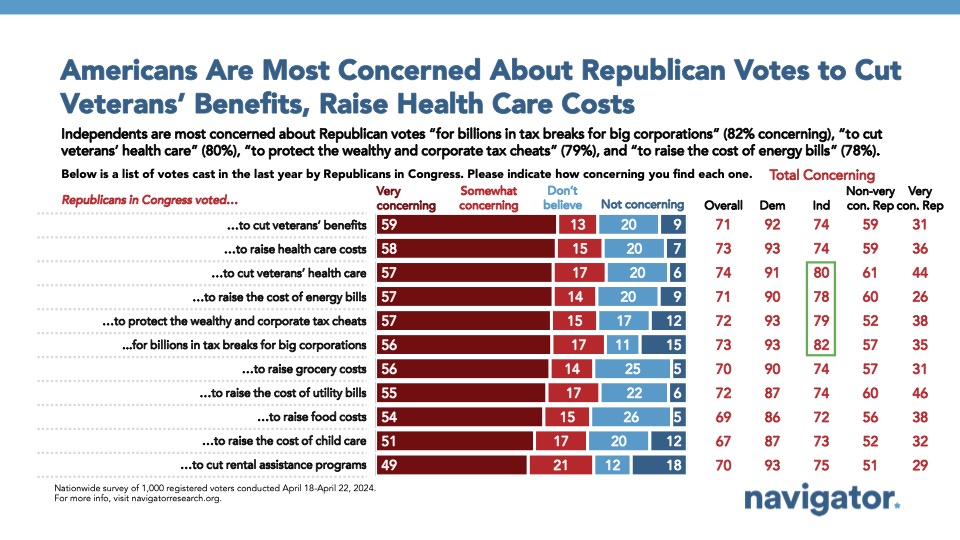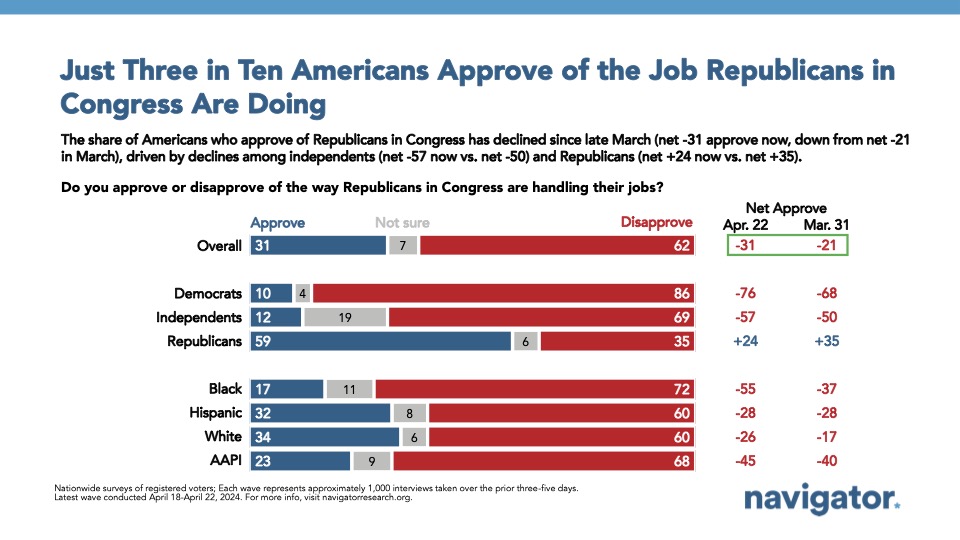Poll: Republicans in Congress
This Navigator Research report contains polling data on the most concerning votes Republicans in Congress have taken one year after passing the “Default on America” Act in the House, as well as current perceptions of House Republicans.
Americans are most concerned about recent Republican votes to cut
veterans’ benefits, to protect the wealthy and corporations, and to raise costs.
One year ago today, Republicans in Congress passed their “Default on America” Act and the top public concerns about it remain the same – it raises health care costs, cuts billions in taxes for big corporations, and takes away benefits from veterans. 73 percent of Americans are concerned that Republicans in Congress voted to raise health care costs (58 percent say this is “very” concerning), including over nine in ten Democrats (93 percent), three in four independents (74 percent), and over half of Republicans (51 percent). Other votes that were most concerning include that “Republicans in Congress voted for billions in tax breaks for big corporations” (73 percent concerning, including among 82 percent of independents), that “Republicans in Congress voted to cut veterans’ health care” (74 percent, including 80 percent of independents), and that “Republicans in Congress voted to protect the wealthy and corporate tax cheats” (72 percent concerning, including among 79 percent of independents). Other votes by Republicans in Congress considered concerning by at least two in three Americans include that they:
- Voted to raise the cost of utility bills (72 percent concerning, including among 74 percent of independents);
- Voted to raise grocery costs (70 percent concerning, including among 74 percent of independents);
- Voted to cut rental assistance programs (70 percent concerning, including among 75 percent of independents); and,
- Voted to raise the cost of child care (67 percent concerning, including among 75 percent of independents).
Americans overwhelmingly disapprove of the job Republicans in Congress are doing.
Three in five Americans continue to disapprove of the way Republicans in Congress are handing their jobs, including seven in ten independents. By a 32-point margin, Americans disapprove of the job performance of Republicans in Congress (31 percent approve – 62 percent disapprove), including nearly seven in ten independents (net -57; 12 percent approve – 69 percent disapprove), and more than one in three Republicans (net +24; 59 percent approve – 35 percent disapprove). Disapproval of Congressional Republicans has increased a net 10 points since late March (from net -21 to net -31).
- Among Republicans, those who do not regularly watch Fox News (net +14; 53 percent approve – 39 percent disapprove) and those who do not identify as MAGA Republicans (net +11; 52 percent approve – 41 percent disapprove) are less likely to approve of Republicans in Congress than Republicans who regularly watch Fox News (net +39; 67 percent approve – 29 percent disapprove) or those who identify as MAGA Republicans (net +37; 65 percent approve – 28 percent disapprove).
- Across racial demographics, Republicans in Congress are most underwater among Black Americans (net -55) and Asian Americans and Pacific Islanders (net -45).
- Reminder: in our survey among constituents in House districts where constituents are closely divided along conservative and progressive ideological lines, battleground constituents with Democratic lawmakers rate those specific lawmakers net favorably by 6 points (38 percent favorable – 32 percent unfavorable), but those with Republican representatives are net unfavorable towards them by 7 points (34 percent favorable – 41 percent unfavorable).
About The Study
Global Strategy Group conducted a public opinion survey among a sample of 1,000 registered voters from April 18-April 22, 2024. 100 additional interviews were conducted among Hispanic voters. 75 additional interviews were conducted among Asian American and Pacific Islander voters. 100 additional interviews were conducted among African American voters. 100 additional interviews were conducted among independent voters. The survey was conducted online, recruiting respondents from an opt-in online panel vendor. Respondents were verified against a voter file and special care was taken to ensure the demographic composition of our sample matched that of the national registered voter population across a variety of demographic variables.






